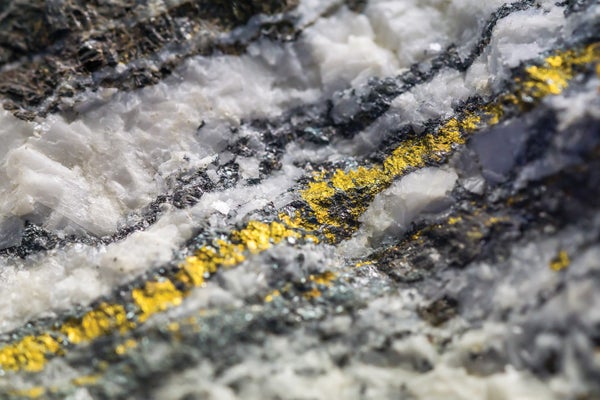Solid gold bars stacked in bank vaults, plating on the summer’s Olympic medals, or even your own pieces of gold jewelry could owe their existence to earthquakes. The stress and strain produced by moving tectonic plates during such an event may trigger a chemical reaction that causes minuscule particles of gold to coalesce into larger nuggets, a new study proposes.
“The biggest finding is showing a new gold-forming process and providing an explanation for how really large gold nuggets might form,” says Christopher Voisey, a co-author of the study and a geologist at Monash University in Australia. “This was always a bit of a conundrum, especially when there isn’t field evidence supporting the alternative gold-forming processes.”
An estimated 75 percent of all mined gold comes from deposits nestled in cracks inside hunks of quartz, one of the most abundant minerals in Earth’s crust. Geochemists have known that dissolved gold existed in fluids in the middle to lower levels of the planet’s crust and that the fluids could seep into quartz cracks. But the amount of fluid involved seemed to limit how much gold could dissolve and thus the size of the gold chunks that formed. Larger nuggets were hard to explain: experts had theorized that gold nanoparticles within the fluid might aggregate into those bigger chunks within the quartz, yet it was unclear how. Unlike dissolved gold, nanoparticles typically wouldn’t have enough chemical energy to start the necessary reaction to build up on the cracks’ surface and form a nugget.
On supporting science journalism
If you're enjoying this article, consider supporting our award-winning journalism by subscribing. By purchasing a subscription you are helping to ensure the future of impactful stories about the discoveries and ideas shaping our world today.
The new study, published in Nature Geoscience, suggests that the geological stress caused by earthquakes might activate a peculiar geochemical property called piezoelectricity—and that such activation makes the formation of larger gold nuggets possible.
The piezoelectric effect, which has been known since the 1880s, is essentially the ability of a material to generate an electric charge when placed under mechanical stress. Many everyday items including microphones, musical greeting cards and inkjet printers take advantage of piezoelectricity, and it occurs naturally in substances from cane sugar to bone.
Quartz can produce this effect because of its structure: it is built from a repeating pattern of positively charged silicon and negatively charged oxygen atoms. When it’s stretched or compressed, the arrangement of these atoms changes, and the charges are dispersed asymmetrically. Negative and positive charges build up in different areas of the quartz, creating an electric field and changing the material’s electric state.
Voisey and his colleagues at Monash—located in the historically gold-rich area of Melbourne—thought that this changed state could lower the energy needed for gold nanoparticles in the fluid to interact with the quartz surface, causing a previously unviable chemical reaction to occur and allowing the nanoparticles to stick and accumulate.
To test their idea, the researchers virtually modeled the electric field that quartz could produce when subjected to earthquakelike forces. They then placed quartz mineral crystals in a fluid containing dissolved gold nanoparticles and other gold compounds and found that, when under seismic wavelike forces, the quartz was able to produce enough voltage to jump-start a buildup of nanoparticles.
The study findings point to an intriguing mechanism that could be responsible for forming at least some of the larger gold nuggets in Earth’s crust—especially “orogenic” deposits where colliding tectonic plates have folded onto one another to create a mountain range.
“It appears to be a certainty that episodic earthquakes are important in helping form these important orogenic gold nugget deposits,” says James Saunders, a consultant geologist who was not involved in the study. He says he would like to see future research look more into the specifics of this process. This could include investigating how long piezoelectricity-causing earthquake forces have to last to produce such deposits and why large gold nugget deposits might develop in only some cracks in quartz in a given area, despite an earthquake theoretically inducing similar stress and strain on all the cracks. “I think it is a great idea/hypothesis,” Saunders says. “I’ll be interested if it stands up on further evaluation.”
Studying piezoelectricity at a very large scale may be difficult, says Colgate University geologist Aubreya Adams, who was also not involved in the study. “Geoscientists are currently working very hard to quantify how stress (or pressure) varies in 3D with time and location,” she says, “something that is easily measured in a lab but much harder to quantify in the crust.”
Voisey and his team plan to extend experimental parameters by testing different pressures or temperatures, for example, to explore their theory further. “This is very much the pilot study for this technique,” he says, “so I’m excited to see where it can go.”
